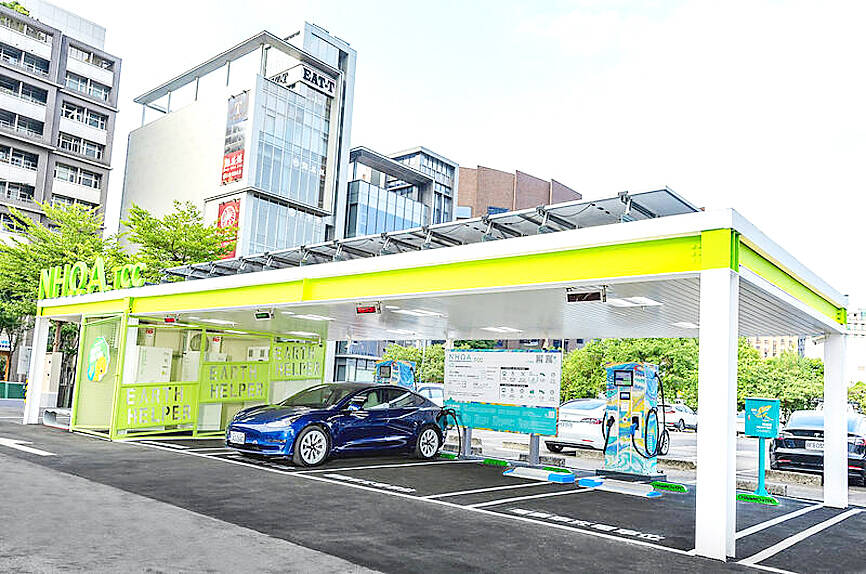Fines are to be imposed from next month on gasoline and diesel cars parked in spaces designated for electric vehicles, the Taipei Parking Management and Development Office said.
The office said the new rule is to be imposed from Friday and that, as per the Parking Facility Act (停車場法), owners of vehicles with traditional internal combustion engines are to be fined NT$600 to NT$1,200 if they park illegally.
Parking spots designated for electric cars in Taipei function as charging stations and are marked by green lines.

Photo courtesy of Taiwan Cement Corp
The office said the new measure is in line with a Ministry of Transportation and Communications regulation that forbids non-electric cars occupying parking spaces designated for electric vehicles.
Parking fees for electric cars are to be altered, with the amount payable set to be calculated by electricity consumed per kilowatt-hour, it added.
Electric car owners pay NT$10 per hour more than drivers of fuel-powered vehicles, with another NT$10 per hour levied on electric car owners who do not charge their vehicles while parked.
Meanwhile, Democratic Progressive Party Taipei City Councilor Ho Meng-hua (何孟樺) on Friday said that the Taipei City Government needs to improve its policies regarding electric cars.
Ho said that the city had only installed about 600 parking spots for electric cars, despite aiming to have 1,200 by next year.
Ho added that 150 of the installed spots were inside parking lots, with some reporting that their charging equipment was being used less than 20 times a month.
Ho said city data showed that Taipei’s Zhongzheng (中正), Nangang (南港) and Daan (大安) districts each had fewer than 30 electric car parking spaces as of the end of last year.
Taipei needs to conduct thorough research before building new parking spaces to maximize efficiency, she added.

HORROR STORIES: One victim recounted not realizing they had been stabbed and seeing people bleeding, while another recalled breaking down in tears after fleeing A man on Friday died after he tried to fight the knife-wielding suspect who went on a stabbing spree near two of Taipei’s busiest metro stations, Taipei Mayor Chiang Wan-an (蔣萬安) said. The 57-year-old man, identified by his family name, Yu (余), encountered the suspect at Exit M7 of Taipei Main Station and immediately tried to stop him, but was fatally wounded and later died, Chiang said, calling the incident “heartbreaking.” Yu’s family would receive at least NT$5 million (US$158,584) in compensation through the Taipei Rapid Transit Corp’s (TRTC) insurance coverage, he said after convening an emergency security response meeting yesterday morning. National

Beijing could eventually see a full amphibious invasion of Taiwan as the only "prudent" way to bring about unification, the US Department of Defense said in a newly released annual report to Congress. The Pentagon's "Annual Report to Congress: Military and Security Developments Involving the People's Republic of China 2025," was in many ways similar to last year’s report but reorganized the analysis of the options China has to take over Taiwan. Generally, according to the report, Chinese leaders view the People's Liberation Army's (PLA) capabilities for a Taiwan campaign as improving, but they remain uncertain about its readiness to successfully seize

Taiwan has overtaken South Korea this year in per capita income for the first time in 23 years, IMF data showed. Per capita income is a nation’s GDP divided by the total population, used to compare average wealth levels across countries. Taiwan also beat Japan this year on per capita income, after surpassing it for the first time last year, US magazine Newsweek reported yesterday. Across Asia, Taiwan ranked fourth for per capita income at US$37,827 this year due to sustained economic growth, the report said. In the top three spots were Singapore, Macau and Hong Kong, it said. South

PLANNED: The suspect visited the crime scene before the killings, seeking information on how to access the roof, and had extensively researched a 2014 stabbing incident The suspect in a stabbing attack that killed three people and injured 11 in Taipei on Friday had planned the assault and set fires at other locations earlier in the day, law enforcement officials said yesterday. National Police Agency (NPA) Director-General Chang Jung-hsin (張榮興) said the suspect, a 27-year-old man named Chang Wen (張文), began the attacks at 3:40pm, first setting off smoke bombs on a road, damaging cars and motorbikes. Earlier, Chang Wen set fire to a rental room where he was staying on Gongyuan Road in Zhongzheng District (中正), Chang Jung-hsin said. The suspect later threw smoke grenades near two exits